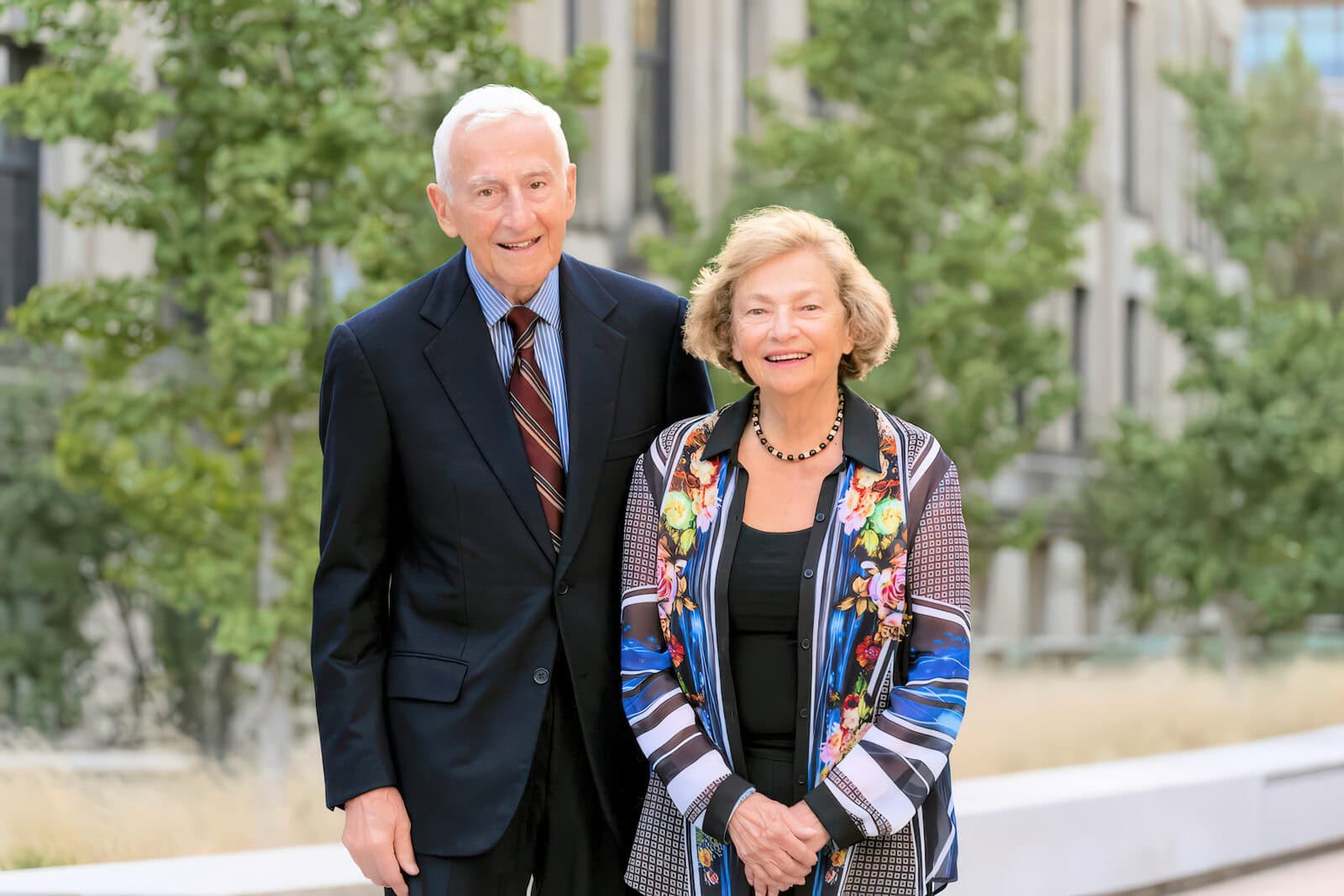$15 million gift of Roy and Diana Vagelos to physician-scientist training program raises their giving to well over $1.2 billion

Internationally renowned physician-scientist and pharmaceutical executive P. Roy Vagelos, MD, and his wife, Diana, have committed $15 million to bolster the Medical Scientist Training Program (MSTP) at Washington University School of Medicine in St. Louis — a pioneering MD/PhD program founded by Roy Vagelos in 1969 to train future generations of physician-scientists.
The gift will establish an endowment to support the education, research, and training of aspiring physician-scientists in one of the nation’s largest and most prestigious programs. In recognition, the program has been named the Roy Vagelos Medical Scientist Training Program.
Vagelos, former CEO and chairman of Merck & Co., launched the MSTP while leading the school’s Department of Biological Chemistry (now Biochemistry and Molecular Biophysics). He envisioned a new kind of medical leader — one who bridges patient care and research to identify clinical problems and pursue laboratory solutions.
Research at Merck under Vagelos helped produce life-saving treatments, including targeted cancer therapies, statins to lower cardiovascular risk, antiviral drugs for HIV, and major vaccine advances. He was also instrumental in making ivermectin — a drug to treat river blindness — available at no cost as part of a successful global health campaign.
“Physician-scientists have played an essential role in biomedical breakthroughs over decades, and the WashU MSTP has led the way in cultivating these careers,” said David H. Perlmutter, MD, executive vice chancellor for medical affairs and dean of WashU Medicine. “Roy and Diana’s latest gift ensures that legacy of excellence continues.”
Roy and Diana Vagelos are among the most influential philanthropists in American science, education, and medicine, with lifetime giving surpassing $1.2 billion.
Their primary philanthropic efforts have supported Columbia University, the University of Pennsylvania, and Barnard College.
At Columbia, where Roy earned his medical degree, their contributions exceed $900 million, including $400 million in 2024 to launch the Roy and Diana Vagelos Institute for Basic Biomedical Science and $250 million in 2017 to make Columbia’s medical school debt-free for eligible students. Additional gifts have advanced precision medicine, student loan elimination, and biomedical research education.
At the University of Pennsylvania, Roy’s undergraduate alma mater, the couple has given $239 million to the School of Arts & Sciences, including an $83.9 million gift in 2024 to establish the Vagelos Institute for Energy Science and Technology and prior support for the Vagelos Scholars Program in Molecular Life Sciences.
For Barnard College, Diana’s alma mater, their giving totals over $55 million, including the school’s largest gift to date, which enhanced STEM education in 2022, and a $10 million endowment for financial aid in 2017.
At WashU Medicine, the Vageloses previously gave $15 million in 2021 to support the Division of Biology & Biomedical Sciences (DBBS), another interdisciplinary training program Roy helped establish in 1973. DBBS integrates departments across the medical and arts & sciences campuses and is among the top graduate programs in the country. It now bears their name in recognition of their support.
WashU’s MSTP, funded for over 50 years by NIH training grants and university investment, merges medical and research education in a single, integrated curriculum. Students begin both clinical and scientific training from day one, with dedicated time for intensive PhD research under world-class faculty.
More than 800 physician-scientists have graduated from the program, with over 80% continuing careers in academic medicine, government, or the biotech and pharmaceutical industries. As a young physician, Roy Vagelos spent a decade at the NIH conducting biochemical research before joining WashU, where he succeeded Nobel laureate Carl Cori as department head.
“Carl and Gerty Cori brought young clinicians into their labs, training them in science before they returned to clinical leadership roles,” Vagelos recalled. “That model inspired how we shaped the MSTP.”
Vagelos left WashU in 1975 to join Merck, where he led the discovery of statins like Mevacor and Zocor. After 20 years there, he served as chairman of Regeneron Pharmaceuticals for nearly three decades and has been elected to the National Academy of Sciences, the National Academy of Medicine, and other prestigious societies.
The Vageloses’ philanthropy spans scholarships, fellowships, facilities, and research programs across leading institutions. Diana serves as vice chair of Barnard’s board of trustees and is a former overseer of Penn’s Museum of Archaeology and Anthropology.
Private investment in science and medicine is increasingly critical given federal funding uncertainties, Vagelos said. “Endowments safeguard the progress of vital research to improve human health. WashU Medicine’s commitment to excellence makes it a smart investment.”
The couple’s new gift will expand research opportunities and training for physician-scientists. Training can take up to eight years, and students are selected based on exceptional undergraduate achievement and potential.
“We seek the very best students, regardless of background,” said Wayne M. Yokoyama, MD, MSTP director and associate dean. “Our program prepares them to integrate lab and clinic experiences and drive innovation in patient care.”
Students themselves inspired the Vageloses. “Roy loves speaking with the students when we visit,” Diana said. “They’re dedicated to improving human health.” Roy added, “The students are the best — they are our future.”
WashU Medicine is a global leader in academic medicine, with 2,900 faculty and more than $1 billion annually invested in research and training. Its NIH funding ranks second among U.S. medical schools. Faculty physicians staff Barnes-Jewish and St. Louis Children’s hospitals and treat patients throughout the region. The institution recently committed $100 million to scholarships and curriculum renewal and remains a national leader in MD/PhD and allied health training.

